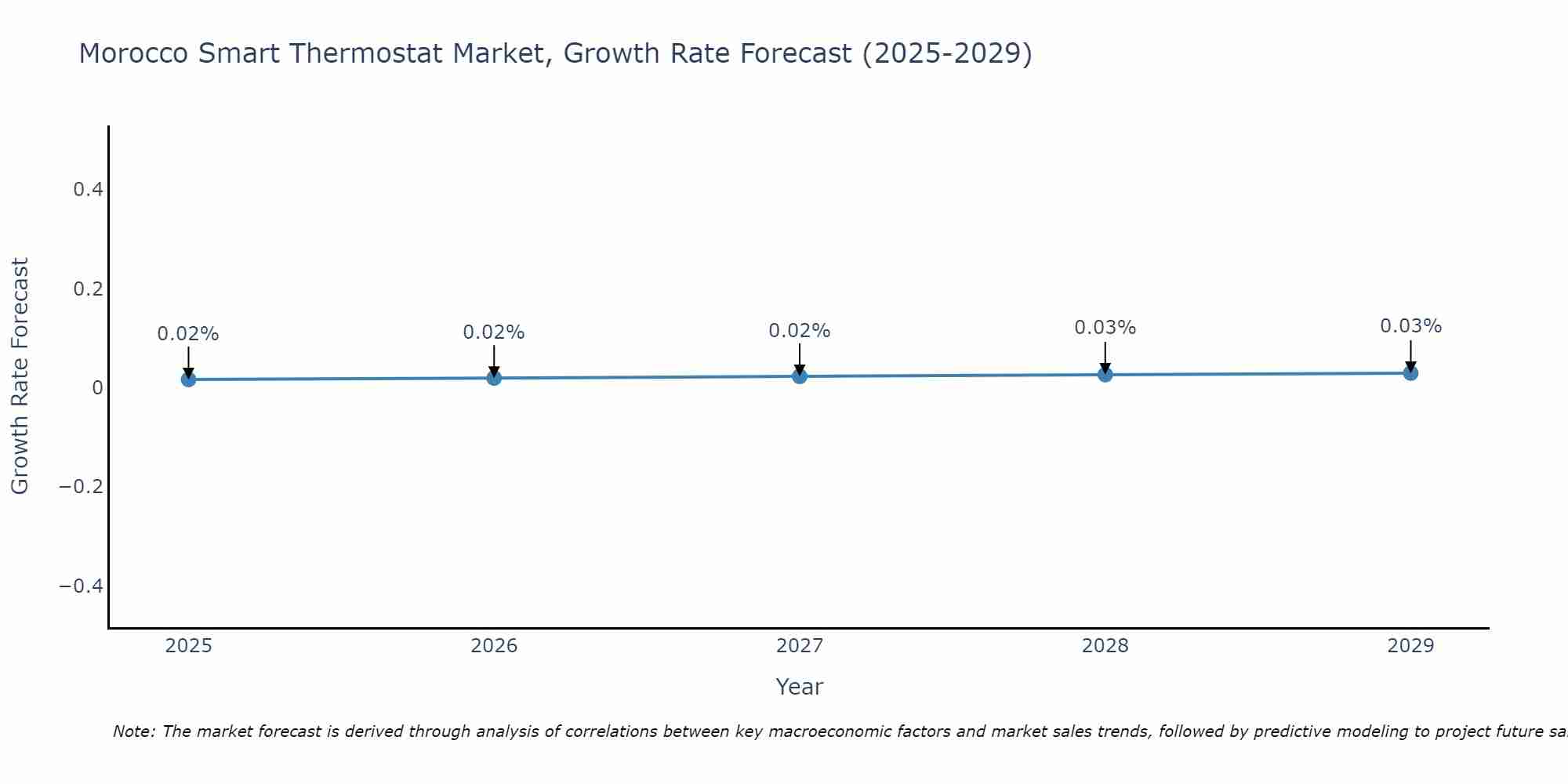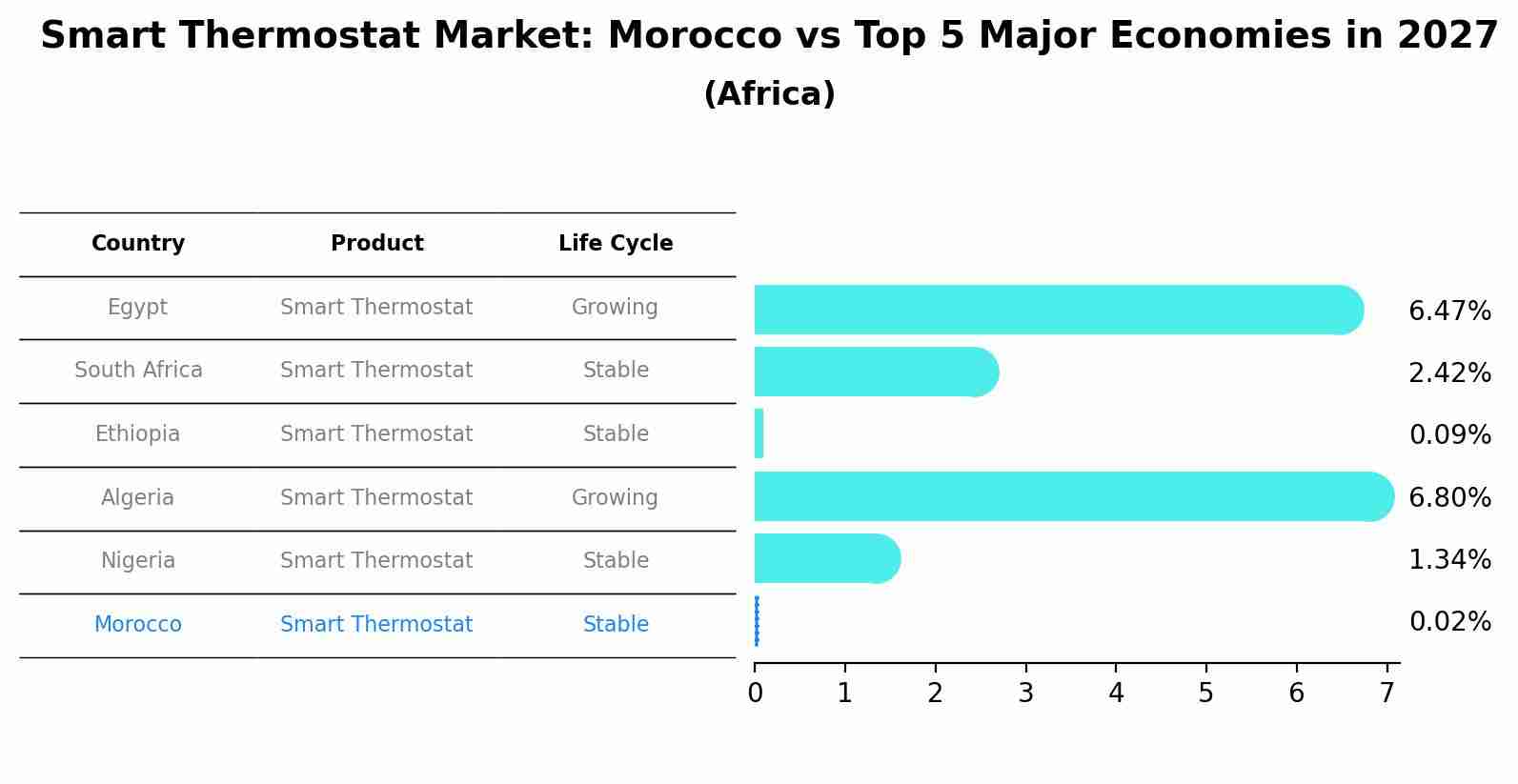Morocco Smart Thermostat Market Outlook | Industry, Share, Size, Revenue, Growth, Forecast, Analysis, Trends, Value, Companies & COVID-19 IMPACT
| Product Code: ETC369533 | Publication Date: Aug 2022 | Updated Date: Jul 2025 | Product Type: Market Research Report | |
| Publisher: 6Wresearch | Author: Shubham Padhi | No. of Pages: 75 | No. of Figures: 35 | No. of Tables: 20 |
Morocco Smart Thermostat Market Size Growth Rate
The Morocco Smart Thermostat Market is likely to experience consistent growth rate gains over the period 2025 to 2029. The growth rate starts at 0.02% in 2025 and reaches 0.03% by 2029.

Smart Thermostat Market: Morocco vs Top 5 Major Economies in 2027 (Africa)
By 2027, Morocco's Smart Thermostat market is forecasted to achieve a stable growth rate of 0.02%, with Egypt leading the Africa region, followed by South Africa, Ethiopia, Algeria and Nigeria.

Morocco Smart Thermostat Market Synopsis
The Morocco Smart Thermostat Market is experiencing steady growth driven by increasing awareness of energy efficiency and the adoption of smart home technology. With rising concerns about energy consumption and environmental sustainability, consumers in Morocco are seeking ways to optimize their energy usage, leading to a growing demand for smart thermostats. These devices offer features such as remote temperature control, energy usage tracking, and integration with smart home ecosystems, making them attractive to tech-savvy consumers. Key players in the market are focusing on product innovation, customization, and partnerships with energy companies to capitalize on this trend. The market is expected to continue its growth trajectory as the country emphasizes energy efficiency initiatives and smart home technology adoption.
Morocco Smart Thermostat Market Trends
The Morocco Smart Thermostat Market is experiencing a growing trend towards energy efficiency and smart home automation. Consumers are increasingly seeking ways to reduce energy consumption and lower their utility bills, driving the demand for smart thermostats that offer remote access and programmable features. The market is also witnessing a shift towards integration with voice-controlled assistants and smart home ecosystems, providing users with enhanced convenience and control over their home environment. Additionally, government initiatives promoting energy conservation and sustainability are further propelling the adoption of smart thermostats in Morocco. As a result, manufacturers are focusing on developing innovative and user-friendly smart thermostat solutions to cater to the evolving needs of consumers in the market.
Morocco Smart Thermostat Market Challenges
In the Morocco Smart Thermostat Market, several challenges are faced that hinder its growth and adoption. One key challenge is the relatively low awareness and understanding of smart thermostat technology among consumers. Many Moroccan households are still unfamiliar with the benefits and functionalities of smart thermostats compared to traditional thermostats. Additionally, the upfront cost of purchasing and installing smart thermostats can be a barrier for some consumers, especially in a market where price sensitivity is high. Furthermore, the lack of standardized regulations and guidelines for smart thermostat usage in Morocco can lead to confusion and hesitation among consumers regarding their effectiveness and safety. Overcoming these challenges will require targeted educational campaigns, competitive pricing strategies, and collaboration with regulatory bodies to establish clear standards for smart thermostat implementation in the country.
Morocco Smart Thermostat Market Investment Opportunities
The Morocco Smart Thermostat Market presents promising investment opportunities driven by increasing awareness of energy efficiency and the growing trend of smart home automation. With the government focusing on promoting sustainable development and energy conservation, there is a rising demand for smart thermostats that offer remote access, energy savings, and personalized comfort. Investing in companies that offer innovative smart thermostat solutions tailored to the Moroccan market can be lucrative. Additionally, partnerships with local energy providers and home builders can help penetrate the market effectively. As the adoption of smart home technology continues to rise in Morocco, investing in the Smart Thermostat Market can capitalize on the growing demand for energy-efficient solutions in the residential and commercial sectors.
Jordan Agar Market Government Policies
The Moroccan government has been actively promoting energy efficiency and sustainability through various policies that impact the Smart Thermostat Market. The National Energy Strategy aims to increase the share of renewable energy sources and improve energy efficiency by 2030. Additionally, the National Energy Efficiency Action Plan outlines measures to reduce energy consumption in buildings, including the promotion of smart technologies such as smart thermostats. The government also offers financial incentives and subsidies for businesses and individuals adopting energy-efficient solutions, including smart thermostats. Overall, the government`s focus on energy efficiency and sustainability provides a favorable environment for the growth of the Smart Thermostat Market in Morocco.
Morocco Smart Thermostat Market Future Outlook
The future outlook for the Morocco Smart Thermostat Market appears promising, driven by the increasing adoption of smart home technologies, growing awareness of energy efficiency, and government initiatives promoting sustainable living. The market is expected to witness substantial growth as consumers seek innovative solutions to optimize energy consumption and reduce utility costs. Additionally, advancements in IoT technology and the rising trend of home automation are likely to further propel the demand for smart thermostats in Morocco. Key players in the market are focusing on product innovation, such as AI integration and remote access features, to cater to evolving consumer preferences. Overall, the Morocco Smart Thermostat Market is poised for expansion, offering lucrative opportunities for companies operating in this sector.
Key Highlights of the Report:
- Morocco Smart Thermostat Market Outlook
- Market Size of Morocco Smart Thermostat Market, 2021
- Forecast of Morocco Smart Thermostat Market, 2031
- Historical Data and Forecast of Morocco Smart Thermostat Revenues & Volume for the Period 2018 - 2031
- Morocco Smart Thermostat Market Trend Evolution
- Morocco Smart Thermostat Market Drivers and Challenges
- Morocco Smart Thermostat Price Trends
- Morocco Smart Thermostat Porter's Five Forces
- Morocco Smart Thermostat Industry Life Cycle
- Historical Data and Forecast of Morocco Smart Thermostat Market Revenues & Volume By Type for the Period 2018 - 2031
- Historical Data and Forecast of Morocco Smart Thermostat Market Revenues & Volume By Wireless for the Period 2018 - 2031
- Historical Data and Forecast of Morocco Smart Thermostat Market Revenues & Volume By Wireless for the Period 2018 - 2031
- Historical Data and Forecast of Morocco Smart Thermostat Market Revenues & Volume By End-User Vertical for the Period 2018 - 2031
- Historical Data and Forecast of Morocco Smart Thermostat Market Revenues & Volume By Residential for the Period 2018 - 2031
- Historical Data and Forecast of Morocco Smart Thermostat Market Revenues & Volume By Commercial for the Period 2018 - 2031
- Morocco Smart Thermostat Import Export Trade Statistics
- Market Opportunity Assessment By Type
- Market Opportunity Assessment By End-User Vertical
- Morocco Smart Thermostat Top Companies Market Share
- Morocco Smart Thermostat Competitive Benchmarking By Technical and Operational Parameters
- Morocco Smart Thermostat Company Profiles
- Morocco Smart Thermostat Key Strategic Recommendations
Frequently Asked Questions About the Market Study (FAQs):
- Single User License$ 1,995
- Department License$ 2,400
- Site License$ 3,120
- Global License$ 3,795
Search
Thought Leadership and Analyst Meet
Our Clients
Related Reports
- Canada Oil and Gas Market (2026-2032) | Share, Segmentation, Value, Industry, Trends, Forecast, Analysis, Size & Revenue, Growth, Competitive Landscape, Outlook, Companies
- Germany Breakfast Food Market (2026-2032) | Industry, Share, Growth, Size, Companies, Value, Analysis, Revenue, Trends, Forecast & Outlook
- Australia Briquette Market (2025-2031) | Growth, Size, Revenue, Forecast, Analysis, Trends, Value, Share, Industry & Companies
- Vietnam System Integrator Market (2025-2031) | Size, Companies, Analysis, Industry, Value, Forecast, Growth, Trends, Revenue & Share
- ASEAN and Thailand Brain Health Supplements Market (2025-2031) | Strategy, Consumer Insights, Analysis, Investment Trends, Opportunities, Growth, Size, Share, Industry, Revenue, Segments, Value, Segmentation, Supply, Forecast, Restraints, Outlook, Competition, Drivers, Trends, Demand, Pricing Analysis, Competitive, Strategic Insights, Companies, Challenges
- ASEAN Bearings Market (2025-2031) | Strategy, Consumer Insights, Analysis, Investment Trends, Opportunities, Growth, Size, Share, Industry, Revenue, Segments, Value, Segmentation, Supply, Forecast, Restraints, Outlook, Competition, Drivers, Trends, Demand, Pricing Analysis, Competitive, Strategic Insights, Companies, Challenges
- Europe Flooring Market (2025-2031) | Outlook, Share, Industry, Trends, Forecast, Companies, Revenue, Size, Analysis, Growth & Value
- Saudi Arabia Manlift Market (2025-2031) | Outlook, Size, Growth, Trends, Companies, Industry, Revenue, Value, Share, Forecast & Analysis
- Uganda Excavator, Crane, and Wheel Loaders Market (2025-2031) | Strategy, Consumer Insights, Analysis, Investment Trends, Opportunities, Growth, Size, Share, Industry, Revenue, Segments, Value, Segmentation, Supply, Forecast, Restraints, Outlook, Competition, Drivers, Trends, Demand, Pricing Analysis, Competitive, Strategic Insights, Companies, Challenges
- Rwanda Excavator, Crane, and Wheel Loaders Market (2025-2031) | Strategy, Consumer Insights, Analysis, Investment Trends, Opportunities, Growth, Size, Share, Industry, Revenue, Segments, Value, Segmentation, Supply, Forecast, Restraints, Outlook, Competition, Drivers, Trends, Demand, Pricing Analysis, Competitive, Strategic Insights, Companies, Challenges
Industry Events and Analyst Meet
Whitepaper
- Middle East & Africa Commercial Security Market Click here to view more.
- Middle East & Africa Fire Safety Systems & Equipment Market Click here to view more.
- GCC Drone Market Click here to view more.
- Middle East Lighting Fixture Market Click here to view more.
- GCC Physical & Perimeter Security Market Click here to view more.
6WResearch In News
- Doha a strategic location for EV manufacturing hub: IPA Qatar
- Demand for luxury TVs surging in the GCC, says Samsung
- Empowering Growth: The Thriving Journey of Bangladesh’s Cable Industry
- Demand for luxury TVs surging in the GCC, says Samsung
- Video call with a traditional healer? Once unthinkable, it’s now common in South Africa
- Intelligent Buildings To Smooth GCC’s Path To Net Zero


















